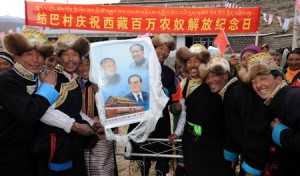Readers know I approach Tibet cautiously, aware that it’s the most emotionally loaded of all topics (after the Nanjing massacre, Yasukuni Shrine, Tiananmen Square, Taiwan independence, etc.), and knowing the situation there is not as black and white as some media in the West make it out to be.
That said, one of my very favorite journalists has written a piece on the topic, including a description of several interactions with the Dalai Lama, that paint a very dark picture of the situation in Tibet,and a very positive one of the DL. His conclusions:
As Tibet enters its second half- century as an oppressed nation—this fall marks the sixtieth anniversary of the arrival of People’s Liberation Army troops in eastern Tibet—there is a sense that what happens there has implications for us all, not just in its environmental consequences, but in its political ones as well. How China deals with Tibet will affect its relations with Taiwan, and if Beijing does come to its senses and takes a more enlightened and farsighted approach to Tibet —as small a threat to it, population-wise, as Idaho might be to the US—it will inevitably win the respect of the larger world and do much to secure its own legacy. Part of the unusual fascination of the China–Tibet issue, after all, is that it seems to suggest a larger question beyond the geopolitical: How much can anyone live on bread alone, and to what extent does some sense of inner wealth either trump or at least make sense of all the material riches we might gain? It’s no surprise, perhaps, that 100,000 Han Chinese have already taken up the study of Tibetan Buddhism, and their numbers are rising quickly.
The Dalai Lama has done his bit by announcing himself “semi-retired,” something like a “senior adviser,” in his own words; if Beijing thinks he is the cause of the recent disturbances and problems in Tibet, he has been effectively saying, he will gladly take himself out of the equation altogether to see if that can help. The Tibetans in Tibet have endured a lifetime of oppression with uncommon patience and fortitude. Now it remains only for China to be as “realistic” and transparent in its handling of Tibet as, the Dalai Lama noted, it was in the wake of the tragic earthquake in Sichuan last summer. His final words to the Chinese students, some of whom were sobbing and working Tibetan Buddhist rosaries as he spoke, were “Investigate, investigate. Analyze, analyze.” He left the Chinese professors with the words, “Keep out the propaganda. Keep out our Tibetan side, too, our emotions. Study the situation!” Two days later, however, as he was addressing the journalists in Tokyo’s Foreign Correspondents’ Club, another Tibetan man was imprisoned, for five years, according to Human Rights Watch. His crime? Daring to tell relatives abroad about what is happening inside Tibet.
I try very hard to learn about the situation in Tibet from Chinese eyes (and this is my favorite article on that subject). I hope my Chinese friends and readers will likewise see what Iyer has to say, and think about whether the topic is perhaps more multidimensional than they’re taught in school. (And that goes for my Western readers as well, come to think of it.)
I remember one of the first times I heard of the Dalai Lama, back in the late 1980s when I was attending a pop “self-actualization” seminar on – pardon the Nietzschean title – the “power of the will.” The seminar leader told us how through sheer force of will, upon the invasion by evil and aggressive Chinese troops, the DL magically transported himself out of Tibet and landed, Star Trek-style, in the hills of India. And that’s how a lot of people in the West saw (and continue to see) him; not necessarily as a super-man, but as a mystical force, existing on a different and higher plane than us mortals.
I no longer think of him as angelic or infallible, as a force of pure good at war with forces of pure evil. But I do think of him as more than a jackal, and of his followers as more than a clique. Again, there’s a middle ground somewhere. What I do know is that after reading Iyer’s piece, I have a deeper respect for the DL (and I admit, living here for a long time can distort your perceptions).
This link is via ESWN, and I thank him for it.
This was a pre-dinner quickie. Hope to elaborate when I get time. Much more to the article than I could comment on tonight. And no, I haven’t forgotten how the standard of living in Tibet rose after the “emancipation” and how much investment China has poured into Tibet. Two sides to every story.


Comments